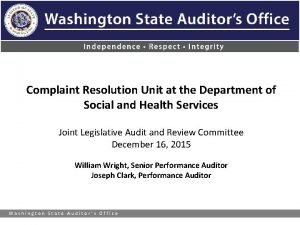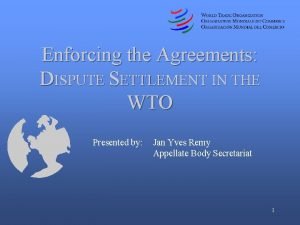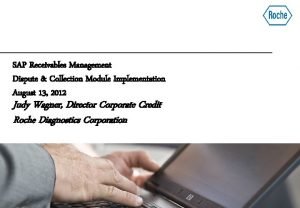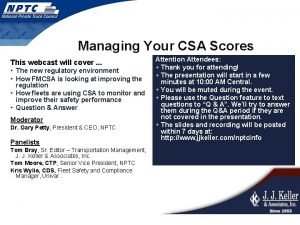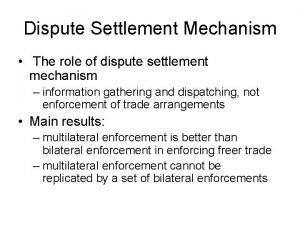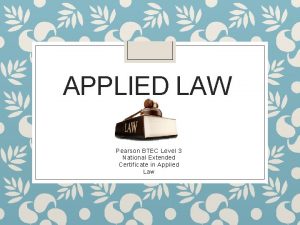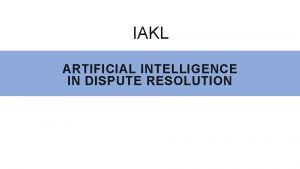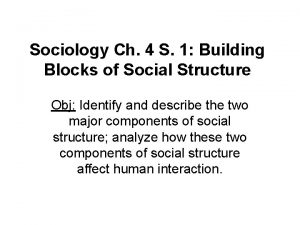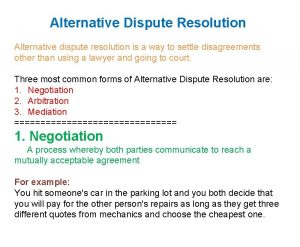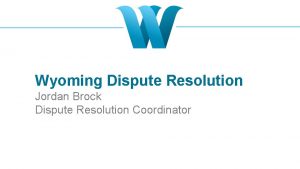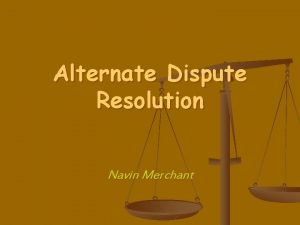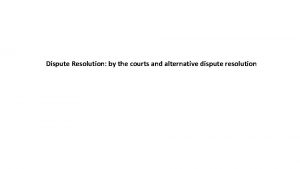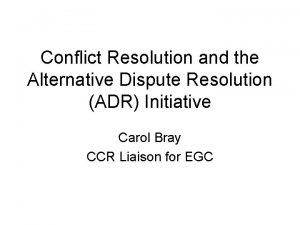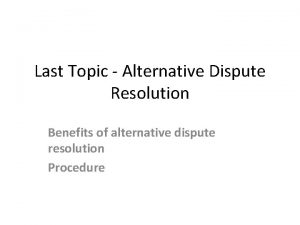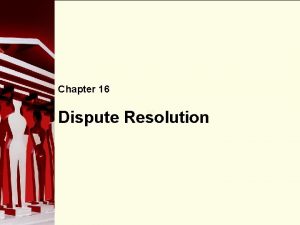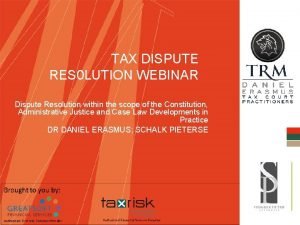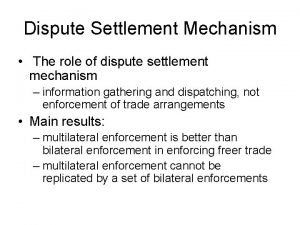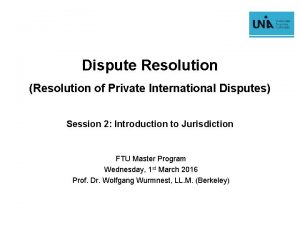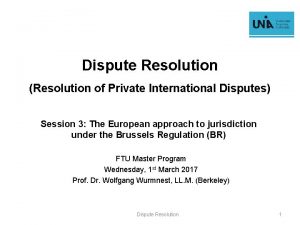The role of alternative dispute resolution in the
























- Slides: 24

The role of alternative dispute resolution in the protection of policyholders: a South African perspective Moscow, 14 September 2017

OVERVIEW: • Statutory Ombud Schemes • Voluntary Ombud schemes • ADR Clauses in contracts • Role of the courts 2

STATUTORY SCHEMES VOLUNTARY SCHEMES SCHEME RELEVANT STATUTE Industry-specific Office of the Ombud for Financial Services Providers (FAIS Ombud) Financial Advisory and Intermediary Services Act 37 of 2002 Ombudsman for Long-term Insurance Ombudsman for Short-term Insurance Statutory Ombud for Financial Services Providers Pension Funds Adjudicator Financial Services Ombud Schemes Act 37 of 2004 Ombudsman for Banking Services Pension Funds Act 24 of 1956 Credit Information Ombud Council for Medical Schemes Act 131 of 1998

Statutory Ombud Schemes: FAIS OMBUD

ENABLING LEGISLATION • Section 20 of the FAIS Act • FAIS Act deals with services rendered by advisors and intermediaries in respect of financial products. • It is therefore not only insurance intermediaries, advisors and representatives who may fall under the FAIS Ombud’s jurisdiction but also those who render any other service in relation to a financial product as determined by the FAIS Act. • A client who has a complaint regarding the conduct of an insurance intermediary cannot just approach the FAIS Ombud. • Part XI of the General Code of Conduct for Authorised Financial Services Providers and Representatives stipulates that a client should first utilise the internal dispute resolution system of the financial services provider (FSP). • The Code states that ‘resolution’, or ‘internal resolution’, means the process of the resolving of a complaint through and in accordance with the internal complaint resolution system and procedures of the provider. FAIS OMBUD: ENABLING LEGISLATION 5

PROVIDER’S OBLIGATIONS WHEN RECEIVING A COMPLAINT • According to the GCC, a provider has the following primary obligations: • to request any client who has a complaint against the provider to lodge the complaint in writing • to maintain a record of complaints for a period of five years; • to handle complaints from clients in a timely and fair manner; • to take steps to investigate and respond promptly to such complaints; and • where a complaint is not resolved to the client’s satisfaction, to advise the client of any further steps which may be available to the him in terms of the FAIS Act or any other law. • Apart from these primary obligations, a provider must also ensure that a number of basic principles are adhered to, namely the maintenance of a comprehensive complaints policy, transparency and visibility, accessibility of facilities, and fairness. 6

PRE-FAIS OMBUD STAGE: INTERNAL COMPLAINTS RESOLUTION

Jurisdiction • Only matters provided for by the FAIS Act. • For instance, where a long-term insurer is of the opinion that a beneficiary’s claim has proscribed, the dispute may be adjudicated by the Ombudsman for Long-term Insurance since the matter falls squarely within the realm of the LTIA. • However, where an insurance broker wrongly advises a person that the financial product he has purchased covers disability, the complaint falls within the ambit of the FAIS Act where the terms ‘advice’ and ‘financial product’ are (in s 1) statutorily defined. • The FAIS Act includes contracts and policies of long-term and short- term insurance in its definition of ‘financial products’. • A complainant may seek any form of relief against the respondent, this is wider than an order to pay an amount of money. • However, where a complainant is claiming a monetary award, it must relate to the redress of financial prejudice or damage suffered or likely to be suffered by the complainant. • Furthermore, a monetary claim should not exceed R 800 000 (3, 520, 992. 00 Rubles) 8

Jurisdiction (continued) • Although the FAIS Ombud has comprehensive powers and can in some respects be equated to a civil court, the FAIS Act makes it clear that a dissatisfed consumer is not obliged to take his complaint to the Ombud but may approach an ordinary civil court instead. • There is nothing in the Act that suggests that the FAIS Ombud must adjudicate disputes. The relevant section (s 40 ‘Saving of rights’) reads as follows: • No provision of this Act, and no act performed under or in terms of any such provision, may be construed as a affecting any right of a client, or other affected person, to seek appropriate legal redress in terms of common law or any other statutory law, and whether relating to civil or criminal matters, in respect of the rendering of any financial service by an authorised financial services provider, or representative of such provider, or any act of a person who is not an authorised financial services provider or a representative of such a provider. 9

CIVIL COURTS AND THE OMBUD • Section 27 : • The Ombud must decline to investigate any complaint if, before the date of off. Icial receipt of the complaint, proceedings have been instituted by the complainant in any Court in respect of a matter which would constitute the subject of the investigation. 10

Claims procedure • A client who approaches the Ombud should ensure that his claim has not prescribed (normal three year period applies) • A claim should be enforced within three years, failing which, the debt becomes unenforceable. 11

Adjudication, determination and appeal In terms of s 27(5) of the FAIS Act, the Ombud: (a) may, in investigating or determining an offcially received complaint, follow and implement any procedure (including mediation) which the Ombud deems appropriate, and may allow any party the right of legal representation; (b) must, in the first instance, explore any reasonable prospect of resolving a complaint by a conciliated settlement acceptable to all parties; (c) may, in order to resolve a complaint speedily by conciliation, make a recommendation to the parties, requiring them to confirm whether or not they accept the recommendation and, where the recommendation is not accepted by a party, requiring that party to give reasons for not accepting it: Provided that where the parties accept the recommendation, such recommendation has the effect of a final determination by the Ombud, contemplated in section 28(1); (d) may, in a manner that the Ombud deems appropriate, delineate the functions of investigation and determination between various functionaries of the Offce; and (e) may, on terms specifed by the Ombud, mandate any person or tribunal to perform any of the functions referred to in paragraph (d). 12

EVALUATION OF SUCCESS OF FAIS OMBUD

SUCCESS • Several matters pertaining to insurance have been adjudicated over the past 14 years. • Procedure is easy, accessible and affordable. • Not all cases end up in determinations, many are settled. • FAIS Ombud is a watchdog in the industry. 14

CRITICISM • Not always clear on legal principles versus fairness • Incorporation of TCF- not law on South Africa • Much of the responsibilities on the brokers and sellers: -e. g. Onerous clauses -claims procedures • Little responsibility on the insurance companies, e. g. almost no attention to product design. 15

VOLUNTARY OMBUD SCHEMES

OMBUDSMAN FOR LONG-TERM INSURANCE (Life, disability, funeral)

Voluntary, own rules, binding on insurers only • Established in 1985 as a form of self- regulation by some long-term insurers. • Developed its own rules and procedures and in 1997 the members of the scheme decided that the Ombudsman’s rulings would no longer be mere recommendations but would be binding on them. • This scheme is now recognised by the Financial Services Ombud Schemes Act. 6 • Determinations of the Ombudsman for Long-term Insurance are binding on the scheme’s members; that is, the insurers, they are not binding on complainants. This means that a complainant who is dissatisfed with the determination made by the Ombud is free to take the matter to court. • By contrast, the determinations of the FAIS Ombud are binding on complainants, which means that the Ombud’s decision has the same effect as a court’s judgment in that it is binding on both parties. • Furthermore, a dissatifed consumer must decide at the outset whether to take his complaint to the FAIS Ombud or to a civil court. If he chooses the Ombud, he cannot then take the matter to court if the Ombud’s determination is not to his liking. • One of the biggest advantages of the Ombudsman for Long-term Insurance scheme is that it is more accessible to complainants than courts and there are no cost implications. 18

Ombudsman for short-term insurance (Property, liability)

Background • The Ombudsman for Short-term Insurance was established in 1989 and the scheme complies with the basic requirements listed in the Financial Services Ombud Schemes Act. • This not-for-profit company answers to a board of directors who represent the industry and consumer representatives. • This voluntary scheme is comparable to the Ombudsman for Long-term Insurance in the sense that the initiative came from the industry and the aim of the scheme is to act as a mediator in disputes arising between insurers and consumers of insurance. 20

Jurisdiction and powers of the Ombudsman Personal lines short-term insurance Commercial lines short-term insurance Claimants Private individuals Sole proprietorships Juristic persons Trusts of partnerships with turnover < R 25 million Types of dispute heard Motor insurance Homeowner’s insurance Household contents insurance Cellphone insurance Travel insurance Disability insurance Credit protection insurance Fire and related risks Glass Theft Motor vehicle insurance Travel insurance Sickness and accident insurance SASRIA claims relating to the above 21

CONTRACTUAL CLAUSES ON ALTERNATIVE DISPUTE RESOLUTION ALLOWED IN LONG-TERM INSURANCE, INCLUDING GROUP LIFE NOT ALLOWED IN SHORT-TERM INSURANCE, PROHIBITED BY STATUTE

ROLE OF THE COURTS: Still a role to play Different from Ombudsman: Law and fairness are considerations Drawbacks: Very expensive Time-consuming

CONCLUSION: THANK YOU!
 Msc construction law and dispute resolution
Msc construction law and dispute resolution High resolution low resolution
High resolution low resolution Complaint resolution unit
Complaint resolution unit Objectives of industrial dispute act 1947
Objectives of industrial dispute act 1947 Financial education services compensation plan
Financial education services compensation plan Wto dispute settlement mechanism
Wto dispute settlement mechanism Sap receivables management
Sap receivables management Maine vs canada war
Maine vs canada war Objectives of industrial dispute act 1947
Objectives of industrial dispute act 1947 Gary petty sms
Gary petty sms Territorial morphology definition ap human geography
Territorial morphology definition ap human geography Dispute settlement mechanism meaning
Dispute settlement mechanism meaning Credit management in o2c
Credit management in o2c Unit 1 dispute solving in civil law
Unit 1 dispute solving in civil law Krishna godavari dispute
Krishna godavari dispute Phyrrho investments it s an english predictive coding case
Phyrrho investments it s an english predictive coding case Rights dispute
Rights dispute Relic boundary
Relic boundary Objectives of industrial dispute act 1947
Objectives of industrial dispute act 1947 Delay and dispute mitigation
Delay and dispute mitigation Krappmann role taking
Krappmann role taking Statuses and their related roles determine
Statuses and their related roles determine Azure worker role
Azure worker role Các châu lục và đại dương trên thế giới
Các châu lục và đại dương trên thế giới Thế nào là hệ số cao nhất
Thế nào là hệ số cao nhất


